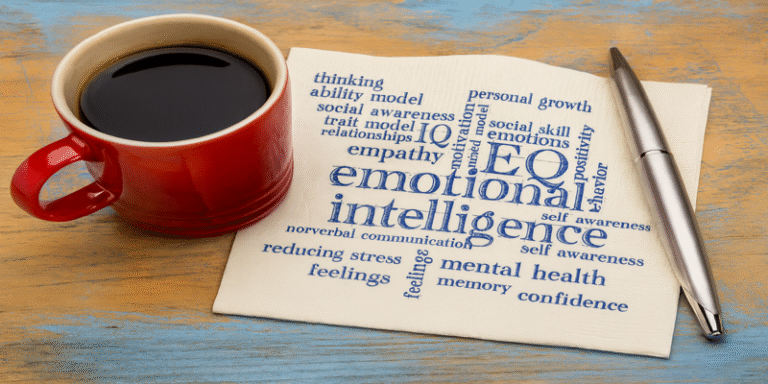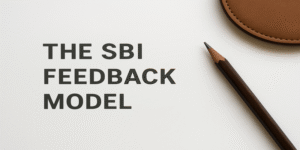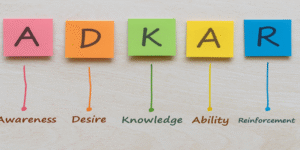In today’s complex organisational environments, emotional intelligence (EI) has emerged as one of the most valuable competencies for professional success. Defined by Goleman (1995) as the ability to recognise, understand, and regulate one’s emotions while influencing those of others, EI plays a vital role in enhancing communication, teamwork, and leadership effectiveness. The infographic “Emotional Intelligence: Do’s and Don’ts and Why They Matter” outlines essential workplace behaviours that strengthen interpersonal relationships and organisational performance.
This article explores the practical application of emotional intelligence in professional settings, focusing on conflict resolution, communication, stress management, and feedback. Drawing upon current academic research and real-world examples, it examines how emotionally intelligent actions lead to better outcomes, and why emotionally unintelligent responses can damage morale and productivity.
1.0 When a Co-worker Seems Upset
Do: Ask if they are okay and offer to listen.
Don’t: Ignore their feelings or pry for details.
Why it matters: Shows empathy and builds trust.
Empathy—the ability to perceive and relate to others’ emotions—is a cornerstone of social awareness, one of Goleman’s five EI domains. Studies by Ufomba and Udensi (2024) show that empathetic communication fosters trust, team cohesion, and a positive climate. Acknowledging a colleague’s emotions helps prevent feelings of isolation and promotes psychological safety (Edmondson, 2019).
A real-world example can be seen at Microsoft, where CEO Satya Nadella redefined leadership culture through empathy. His approach encouraged managers to listen actively and support team members during challenges, leading to measurable increases in innovation and engagement (Gallo, 2022).
2.0 During Team Disagreements
Do: Stay calm and look for common ground.
Don’t: Take sides or get defensive.
Why it matters: Helps find solutions and maintain peace.
Team disagreements are inevitable in dynamic workplaces. However, emotionally intelligent individuals approach conflict with self-regulation—managing impulses, avoiding reactive behaviour, and seeking constructive outcomes.
According to Sinan (2025), emotionally intelligent leaders facilitate collaborative problem-solving by focusing on shared goals rather than personal agendas. This aligns with Goleman’s framework of relationship management, which emphasises diplomacy and communication as critical leadership tools.
A good example is the Agile Project Management model, where emotionally intelligent leaders foster collaboration across cross-functional teams, reducing tension and improving project outcomes (Sinan, 2025).
3.0 When You Disagree with a Decision
Do: Ask questions to understand why.
Don’t: Complain to others behind closed doors.
Why it matters: Promotes open communication and respect.
Disagreements can strengthen organisational culture when handled appropriately. Asking clarifying questions demonstrates self-awareness and a desire to understand rather than resist.
As Mamata and Kavilal (2025) note, emotionally intelligent employees manage dissent through dialogue and curiosity rather than gossip or defiance. Constructive questioning also aligns with transformational leadership theory, where openness fosters trust and transparency (Bass & Riggio, 2006).
For instance, at Google, managers are encouraged to challenge ideas respectfully in open forums, ensuring innovation through honest yet emotionally intelligent communication (Schmidt & Rosenberg, 2014).
4.0 When Facing a Tough Challenge
Do: Ask for help or advice when needed.
Don’t: Pretend you have all the answers.
Why it matters: Encourages teamwork and learning.
Acknowledging limitations is a key component of emotional maturity. Emotionally intelligent professionals understand that vulnerability and collaboration often lead to stronger problem-solving outcomes.
Research by Segbenya and Amissah-Wilson (2024) found that emotionally intelligent employees in developing economies demonstrated higher productivity by engaging collaboratively and acknowledging areas for improvement. This finding reinforces the importance of social intelligence and interpersonal competence in team performance.
A practical illustration comes from Unilever, where teams operate under a culture of “collective intelligence”—encouraging open discussion of challenges without fear of judgment (Unilever, 2022).
5.0 During Stressful Projects
Do: Take short breaks to reset.
Don’t: Let stress affect how you treat others.
Why it matters: Maintains a positive work environment.
The ability to manage stress effectively reflects emotional resilience, an essential aspect of self-regulation. High stress can impair decision-making and strain relationships if not managed well.
According to Odame and Pandey (2025), emotional intelligence correlates strongly with stress reduction and improved mental health outcomes in leadership roles. Leaders who practice mindfulness and emotional control are better equipped to maintain team morale during high-pressure situations.
Organisations like SAP and Deloitte have introduced mindfulness-based EI training to help employees recognise stress triggers and respond constructively, leading to measurable reductions in burnout and absenteeism (Harvard Business Review, 2023).
6.0 When Receiving Feedback
Do: Listen fully and thank them for input.
Don’t: Argue or dismiss their points.
Why it matters: Shows openness to growth and respect.
Feedback, when approached with self-awareness and humility, becomes a catalyst for growth. Emotionally intelligent professionals view feedback not as criticism but as an opportunity to improve.
Research by Radha and Nirubarani (2024) in the banking sector found that emotionally intelligent employees respond to feedback with adaptability and appreciation, improving overall performance. Leaders can reinforce this by modelling gratitude and curiosity when receiving critique.
Example: At Adobe, the “Check-In” feedback system replaces annual reviews with regular, informal conversations that promote trust, emotional openness, and performance improvement (Forbes, 2023).
7.0 If You’re Having a Bad Day
Do: Let your team know you might need space.
Don’t: Take it out on others or act cold.
Why it matters: Keeps your mood from affecting the team.
Emotional contagion—the phenomenon where emotions spread within a group—means that leaders’ moods significantly impact team morale (Goleman, 2013). Acknowledging when you’re not at your best demonstrates emotional responsibility and prevents miscommunication.
As Ugoani (2024) notes, emotionally intelligent managers in Nigerian organisations used emotional self-regulation to maintain composure, reducing conflict and maintaining harmony during crises. This supports the view that awareness and honesty about one’s emotional state protect team productivity.
8.0 Before Sending an Important Email
Do: Read it over and check your tone.
Don’t: Write and send when you’re upset.
Why it matters: Prevents misunderstandings and conflicts.
Digital communication lacks non-verbal cues, making tone management essential. Emotionally intelligent communicators pause, reflect, and reread their messages to ensure clarity and respect.
A study by Paiva (2024) underscores the role of emotional intelligence in digital correspondence, showing that leaders with higher EI scores crafted clearer and more considerate messages. This reduced conflict and improved team satisfaction in remote environments.
Real-world example: IBM encourages employees to review emails using its “Tone Analyzer,” an AI tool that helps ensure emotionally intelligent communication (IBM, 2023).
Integrating Emotional Intelligence Across the Workplace
Emotional intelligence underpins effective teamwork, communication, and leadership. Gajda and Ćwiąkała (2025) highlight that EI competencies such as empathy, stress management, and self-regulation directly enhance team collaboration and innovation.
In essence, emotionally intelligent individuals display:
- Self-awareness – Recognising personal emotional states.
- Self-regulation – Managing impulses and staying composed.
- Motivation – Staying driven even under adversity.
- Empathy – Understanding others’ feelings.
- Social skills – Building positive relationships.
As George (2024) observes, leaders who model these behaviours create a ripple effect that influences the entire organisational culture, making emotional intelligence a strategic leadership asset rather than a soft skill.
The infographic “Emotional Intelligence: Do’s and Don’ts” succinctly captures how everyday emotional habits shape workplace culture. Emotionally intelligent professionals actively listen, manage emotions, and communicate with empathy—fostering trust, teamwork, and mutual respect.
As workplaces grow more complex and diverse, emotional intelligence has become indispensable for conflict management, stress resilience, and ethical leadership. Organisations that prioritise EI development through training, coaching, and reflective practices not only enhance productivity but also create environments where people feel valued and motivated.
In short, emotional intelligence is the quiet power that transforms ordinary workplaces into thriving, human-centred ecosystems.
References
Bass, B.M. & Riggio, R.E. (2006) Transformational Leadership. 2nd ed. Mahwah, NJ: Lawrence Erlbaum Associates.
Edmondson, A. (2019) The Fearless Organization: Creating Psychological Safety in the Workplace for Learning, Innovation, and Growth. Wiley.
Gallo, C. (2022) The Bezos Blueprint. Pan Macmillan.
Gajda, W. & Ćwiąkała, M. (2025) The Importance of Emotional Intelligence in Leadership for Building an Effective Team. Zeszyty Naukowe Politechniki Śląskiej.
George, S. (2024) Leading With Emotional Intelligence: A Systematic Review. ProQuest Dissertations.
Goleman, D. (1995) Emotional Intelligence: Why It Can Matter More Than IQ. New York: Bantam Books.
Harvard Business Review (2023) How Mindfulness Enhances Emotional Intelligence. [Online] Available at: [https://hbr.org] (Accessed: 7 October 2025).
Mamata, C. & Kavilal, E.G. (2025) ‘Exploring Emotional Intelligence and Conflict Management,’ Journal of Advances in Management Research.
Odame, C. & Pandey, M. (2025) ‘The Relationship Between Emotional Intelligence and Conflict Management Styles,’ SAGE Open, 15(2).
Paiva, M.O. (2024) Emotional Intelligence: A Catalyst for Organisational Communication. IGI Global.
Radha, P. & Nirubarani, J. (2024) The Impact of Emotional Intelligence on Conflict Resolution in Banking Sector, Apex Journal of Business and Management.
Segbenya, M. & Amissah-Wilson, J. (2024) Emotional Intelligence and Employee Productivity in a Developing Economy, ResearchGate.
Sinan, S.M. (2025) Effects of Emotional Intelligence in Enhancing Team Collaboration and Conflict Resolution in Agile Project Management. Harrisburg University.
Ufomba, R.E. & Udensi, C.E. (2024) Emotional Intelligence and Conflict Management in Selected Universities in South-East Nigeria. ResearchGate.
Unilever (2022) Compassionate Leadership and Psychological Safety at Work. [Online] Available at: [https://www.unilever.com] (Accessed: 7 October 2025).
Ugoani, J. (2024) Emotional Intelligence: Leading, Managing and Conflict Management in Organisations. SSRN.









